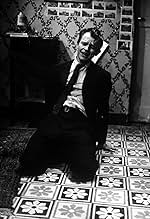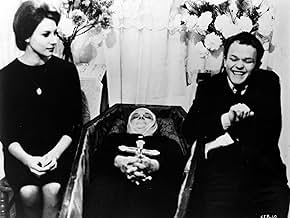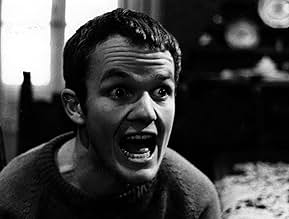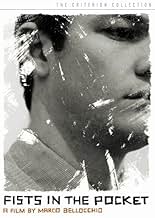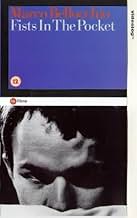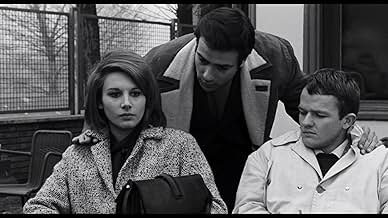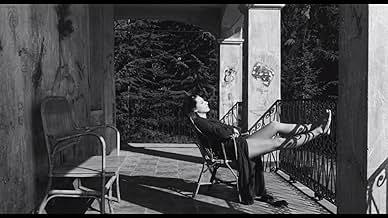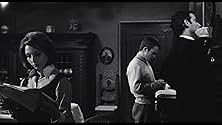VALUTAZIONE IMDb
7,6/10
5136
LA TUA VALUTAZIONE
Un giovane prende misure drastiche per liberare la propria famiglia disfunzionale dalle varie cose che la affliggono.Un giovane prende misure drastiche per liberare la propria famiglia disfunzionale dalle varie cose che la affliggono.Un giovane prende misure drastiche per liberare la propria famiglia disfunzionale dalle varie cose che la affliggono.
- Regia
- Sceneggiatura
- Star
- Premi
- 4 vittorie e 5 candidature
Pier Luigi Troglio
- Leone
- (as Pierluigi Troglio)
Jeannie McNeil
- Lucia
- (as Jenny Mac Neil)
Trama
Lo sapevi?
- QuizThe house, the film's main location, is the house director Marco Bellocchio spent his childhood days in.
- BlooperWhen the whole family is having dinner, Augusto is seated at one corner of the table and the mother is sitting on a side at the other corner. The cat is shown to be eating meat off the mother's plate in one scene, but in the next scene Augusto is shown picking up the cat as if was right next to him on the table. Once he removes the cat, the next camera angle again shows Augusto and the mother at opposite ends.
- Citazioni
Alessandro: I'm a volcano of ideas.
- ConnessioniEdited into Sorelle (2006)
- Colonne sonoreExcerpt from La Traviata
composed by Giuseppe Verdi (uncredited)
lyrics by Francesco Maria Piave (uncredited)
Recensione in evidenza
Pimpin places a call to his favorite writer Michel Houellebecq.
Pimpin: Hello.
Michel: Hello. Who is this?
Pimpin: Michel, its me Pimpin.
Michel: What do you want?
Pimpin: Sorry to disturb. I wanted to discuss a film that I watched. I wanted to hear your thoughts on it. Its this Italian film - Fists in the Pocket by Marco Belloccio. Came out in the 60s.
Michel: OK.
Pimpin: What do you think about it?
Michel: It did have a couple of nice pieces of ass. Paola Pitagora was unforgettable.
Pimpin: Hahahha. I agree. What did you think about the film?
Michel: Well, it was one of those films where the protagonist rebelled against his family and Catholic values. You know what I think about all that stuff, Pimpin. Nothing good came out of it. Sure, a lot of people escaped their families. And then they went and lived alone. Did drugs. Drank a lot. Individuality and personal freedom. Look at where all that got Europe now.
Pimpin: I thought the film was quite slow.
Michel: Its a piece of crap. But then, it was made in the 60s.
Pimpin: I did some research on it. The film apparently predicted the student and youth riots of the late 60s in Italy.
Michel: Hahahah. You really bought into all that crap?
Pimpin: I know its a bit like how Indian social commentators use crappy films like Deewar to explain the 70s and 80s.
Michel: Exactly. Its completely phony Pimpin.
Pimpin: I'm still confused. I don't know what to think about the film. I mean, the film is quite depressing.
Michel: Well, tell me something about the cinematography, pacing and background score. That would help us interpret it better.
Pimpin: It was a very stark film. Morricone's score was very bleak. The score is played during all the murder and post-murder scenes. It is one of Morricone's bleakest scores. I liked the way some of the scenes were framed. Like at the party where the rebellious protagonist is sitting alone and there are a lot of people dancing. He does not even drink. He has no bad habits. But he wants to kill off his family. The pacing was slow.
Michel: Did you identify with the film?
Pimpin: Sort of. But like I said it was too slow. The actors were great. The director was quite successful in capturing the claustrophobic environment in which the family lives.
Michel: Did you get married recently?
Pimpin: Yes.
Michel: So you are not to be trusted.
Pimpin: Why?
Michel: You would have liked this film a lot more during your wild bachelor days.
Pimpin: Thats probably true, Michel.
Michel: It is.
Pimpin: I did think that it was a very personal film. I mean, the director is very talented. He did portray the ills of the bourgeois life and the life lived on pure instinct quite well. I don't think he was rooting for either.
Michel: Did it work as a murder mystery?
Pimpin: No. I think it works best as the zeitgeist of that time in Italy. But it was quite boring for me.
Michel: OK. Is there anything else that you want to discuss?
Pimpin: The actors were great. I mean, most of them were better than the ones in the worst Indian movies. But I would not watch another movie because anyone of them were in it.
Michel: OK.
Pimpin: Read about he Paris attacks. Quite scary.
Michel: (Silence)
Pimpin: Hello?
Michel: Pimpin, you weren't too impressed by this film. In fact, you were bored to death. You only called me because it had an 8 rating on IMDb.
Pimpin: You are right, Michel.
Michel: Take care, Pimpin.
Pimpin: Bye, Michel.
Michel: Bye
Pimpin: Hello.
Michel: Hello. Who is this?
Pimpin: Michel, its me Pimpin.
Michel: What do you want?
Pimpin: Sorry to disturb. I wanted to discuss a film that I watched. I wanted to hear your thoughts on it. Its this Italian film - Fists in the Pocket by Marco Belloccio. Came out in the 60s.
Michel: OK.
Pimpin: What do you think about it?
Michel: It did have a couple of nice pieces of ass. Paola Pitagora was unforgettable.
Pimpin: Hahahha. I agree. What did you think about the film?
Michel: Well, it was one of those films where the protagonist rebelled against his family and Catholic values. You know what I think about all that stuff, Pimpin. Nothing good came out of it. Sure, a lot of people escaped their families. And then they went and lived alone. Did drugs. Drank a lot. Individuality and personal freedom. Look at where all that got Europe now.
Pimpin: I thought the film was quite slow.
Michel: Its a piece of crap. But then, it was made in the 60s.
Pimpin: I did some research on it. The film apparently predicted the student and youth riots of the late 60s in Italy.
Michel: Hahahah. You really bought into all that crap?
Pimpin: I know its a bit like how Indian social commentators use crappy films like Deewar to explain the 70s and 80s.
Michel: Exactly. Its completely phony Pimpin.
Pimpin: I'm still confused. I don't know what to think about the film. I mean, the film is quite depressing.
Michel: Well, tell me something about the cinematography, pacing and background score. That would help us interpret it better.
Pimpin: It was a very stark film. Morricone's score was very bleak. The score is played during all the murder and post-murder scenes. It is one of Morricone's bleakest scores. I liked the way some of the scenes were framed. Like at the party where the rebellious protagonist is sitting alone and there are a lot of people dancing. He does not even drink. He has no bad habits. But he wants to kill off his family. The pacing was slow.
Michel: Did you identify with the film?
Pimpin: Sort of. But like I said it was too slow. The actors were great. The director was quite successful in capturing the claustrophobic environment in which the family lives.
Michel: Did you get married recently?
Pimpin: Yes.
Michel: So you are not to be trusted.
Pimpin: Why?
Michel: You would have liked this film a lot more during your wild bachelor days.
Pimpin: Thats probably true, Michel.
Michel: It is.
Pimpin: I did think that it was a very personal film. I mean, the director is very talented. He did portray the ills of the bourgeois life and the life lived on pure instinct quite well. I don't think he was rooting for either.
Michel: Did it work as a murder mystery?
Pimpin: No. I think it works best as the zeitgeist of that time in Italy. But it was quite boring for me.
Michel: OK. Is there anything else that you want to discuss?
Pimpin: The actors were great. I mean, most of them were better than the ones in the worst Indian movies. But I would not watch another movie because anyone of them were in it.
Michel: OK.
Pimpin: Read about he Paris attacks. Quite scary.
Michel: (Silence)
Pimpin: Hello?
Michel: Pimpin, you weren't too impressed by this film. In fact, you were bored to death. You only called me because it had an 8 rating on IMDb.
Pimpin: You are right, Michel.
Michel: Take care, Pimpin.
Pimpin: Bye, Michel.
Michel: Bye
- PimpinAinttEasy
- 24 nov 2015
- Permalink
I più visti
Accedi per valutare e creare un elenco di titoli salvati per ottenere consigli personalizzati
- How long is Fists in the Pocket?Powered by Alexa
Dettagli
- Tempo di esecuzione1 ora 50 minuti
- Colore
- Mix di suoni
- Proporzioni
- 1.85 : 1
Contribuisci a questa pagina
Suggerisci una modifica o aggiungi i contenuti mancanti

Divario superiore
By what name was I pugni in tasca (1965) officially released in India in English?
Rispondi
![Guarda Trailer [OV]](https://m.media-amazon.com/images/M/MV5BNjc5ZDU5NDgtZTliZC00MjQwLThjNjItMDhjZmFmZGMxZTI2XkEyXkFqcGdeQXRyYW5zY29kZS13b3JrZmxvdw@@._V1_QL75_UY281_CR6)
